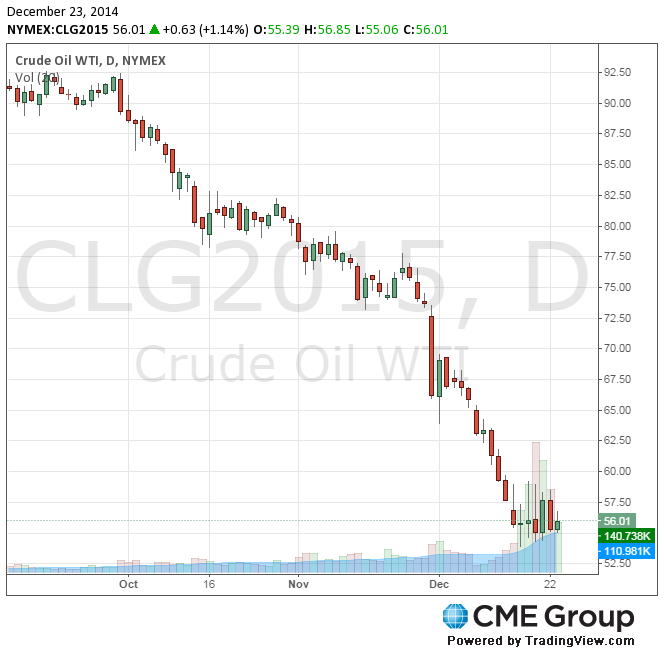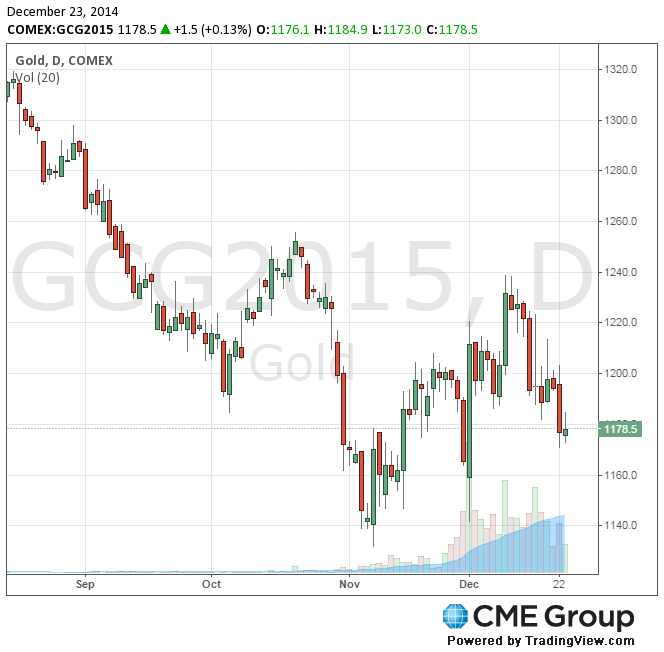Notícias do Mercado
-
16:40
Oil advanced
Oil advanced after economic growth in the U.S., the world's biggest crude-consuming nation, surged at the fastest pace in more than a decade in the third quarter.
West Texas Intermediate advanced as much as 2.9 percent in New York, while Brent gained as much as 2.3 percent in London. Gross domestic product grew at a 5 percent annual rate from July through September, the biggest advance since 2003, revised figures from the Commerce Department showed today in Washington. Futures pared gains as a gauge of the dollar climbed to a five-year high.
Oil is set for the biggest annual loss since 2008 amid the highest U.S. output in more than three decades and signs of slowing global demand growth. U.S. crude supplies probably fell for a second week, a Bloomberg survey showed before government data tomorrow. Saudi Arabia, OPEC's biggest producer, doesn't plan to pump less "whatever the price is," Oil Minister Ali Al-Naimi told the Middle East Economic Survey yesterday.
"We had a strong GDP number today and that implies a certain amount of demand that we weren't looking for previously," Bob Yawger, director of the futures division at Mizuho Securities USA Inc. in New York, said by phone. "We're getting some headwinds from the dollar, which is at multiyear highs, but I think the strong GDP will keep us higher."
WTI for February delivery increased 59 cents, or 1.1 percent, to $55.85 a barrel at 10:09 a.m. on the New York Mercantile Exchange. The volume of all futures traded was about 8.7 percent below the 100-day average for the time of day. Futures are down 43 percent this year.
Brent for February settlement gained 45 cents, or 0.8 percent, to $60.56 a barrel on the London-based ICE Futures Europe exchange. Volume was 41 percent below the 100-day average. Prices are down 45 percent in 2014. The European benchmark traded at a $4.71 premium to WTI.

-
16:20
Gold moderately increased from three-week low
Gold prices rise with marked on the eve of a three-week low.
Liquidity in the market decreased in the absence of Japanese players and on Christmas Eve, and traders watch the movement of the stock and foreign exchange markets and oil.
The growth of the stock price and the dollar weaken demand for gold as a low-risk asset and the decline in oil prices makes the precious metal less attractive as a hedge against inflation.
US stock indices S & P 500 and Dow Jones finished Monday at historic highs, and the dollar index against a basket of six major currencies close to nine-year peak.
Today was published a large block of US statistics, which caused a stronger dollar and curb the rise in gold prices.
US Department of Commerce to improve the estimate of GDP growth in the 3rd quarter of 2014 from 3.9% to 5%, based on the annual rate, according to final figures released. Analysts on average expected increase to 4.3%. Growth in July-September was the most significant since the third quarter of 2003.
Consumer spending, which accounts for about 70% of the US economy, rose in the 3rd quarter by 3.2%, adding 2.5 percentage points (pp) to GDP growth, whereas previously reported an increase of 2 2%. Their growth, in particular, explained the highest for several years increased spending on durable goods - by 9.2% (8.7% in the previous report, the Ministry of Trade). In early 2015 the rise in this segment is likely to accelerate due to the low gasoline prices and the situation on the labor market.
Consumer confidence in the US in December 2014 rose to 93.6 points from 88.8 in November level points, according to final data, University of Michigan, which calculates the figure. Value of the indicator was revised downward from the preliminary estimated at 93.8 points, but remained the highest since January 2007. Analysts had expected a reduction estimates to 93.5 points.
Growth in consumer confidence in the US reflects mainly lower energy prices, improvements in the labor market and higher salaries. The Fall of the cost of gasoline allows Americans to send more money to buy other goods and services - it allows you to count on increasing consumer spending in the holiday season.
Will support the demand for gold gives physical markets in Asia. Margins in Shanghai rose to $ 5 per ounce to the price in London at $ 03.02 on Monday.
According to the IMF, Russia in November increased gold reserves of the eighth month in a row, while Ukraine has reduced stocks for the second month in a row.
The cost of the February gold futures on the COMEX today rose to 1184.90 dollars per ounce.

-
11:20
Oil: Prices recover after yesterday’s decline
Brent crude and West Texas Intermediate are trading higher today rebounding from yesterday's decline. Yesterday Saudi Oil Minister Ali Al-Naimi said OPEC's biggest producer will seek to maintain market share and that global demand growth this year was slower than expected. Iraq plans to boost its production next year, Oil Minister Adel Abdul Mahdi said. Trading volatility stayed at the highest level in more than three years.
Oil has slumped about 21 percent since OPEC decided against cutting its production target last month, prompting a plunge in the value of currencies from the Russian ruble to the Norwegian krone. Prices have tumbled by half since June amid surging production and slower-than-expected demand growth. Output in the U.S. is the highest in three decades.
Today prices stabilized as markets expect firm data from the United States, the world's largest consumer of oil. The OPEC sees oil prices to rebound to USD70-USD80 by the end of next year on a growing world economy.
Brent Crude added +1.15%, currently trading at USD60.80 a barrel after its new lows from last Friday. West Texas Intermediate rose +1.57% currently quoted at USD56.13.
-
11:00
Gold trading higher after yesterday’s slump
Gold prices recovered from yesterday's slump in prices which was partly due to the release of data on the US housing market, which disappointed the markets. Sales of existing homes in November fell to a six-month low. This is a sign that the housing market continues to lag, despite the surge in employment and accelerate economic growth. Gold today was gaining ground from 3-week lows as a strong U.S. dollar and stock markets in rally-mode continue to weigh on the precious metal. All eyes are now on U.S. data being published later in the day including GDP for the third quarter, durable goods orders and new homes sales.
Trading volumes are expected to be low this week which could lead to volatile and erratic markets. The precious metal is currently quoted at USD1,179.20, +0,69% a troy ounce.
GOLD currently trading at USD1,179.20
-
09:20
Press Review: Greek Drama Draws Market Scrutiny as ECB Impact Weighed
REUTERS
Australian dollar hits 4-1/2-year low on China growth worries(Reuters) - The Australian dollar hit a 4-1/2-year trough against its U.S. counterpart on Tuesday as prices of iron for construction fell in China amid weak demand from the property sector and after Australia's premier warned of heightened "terrorist chatter".
Following the siege in a Sydney cafe a week ago, Australian Prime Minister Tony Abbott said the public must remain alert as the country headed into Christmas and New Year celebrations, helping to prod lower an Aussie dollar already weakened by the data from China.
Source: http://www.reuters.com/article/2014/12/23/us-markets-forex-idUSKBN0K000720141223
BLOOMBERG
Greek Drama Draws Market Scrutiny as ECB Impact Weighed
Intraday volatility on the Greek ASE Index (ASE) and the broader Stoxx Europe 600 Index surged to double their annual average last week after Prime Minster Antonis Samaras failed to win two-thirds support in parliament for his candidate to succeed President Karolos Papoulias. A second of three potential ballots is scheduled for today at noon. Greece's benchmark stock gauge dropped 1.8 percent at 11:04 a.m. in Athens today.
Anxiety that voters will kick out leaders committed to Greece's bailout wreaked havoc on equities earlier this month, sending the ASE down 20 percent for its biggest weekly slump since 1987. The losses followed Samaras's decision to seek parliamentary support for candidate Stavros Dimas, a procedure that may end up spurring national elections. Losing would empower Syriza, the opposition party that seeks a writedown on Greek debt held by the European Central Bank and others.
BLOOMBERG
Ukraine Cuts Gold Reserve to Nine-Year Low as Russia Buys
Ukraine reduced gold reserves for a second month to the lowest since August 2005 as Russia bought bullion for an eighth month to take its holdings to the highest in at least two decades, according to the International Monetary Fund.
Ukraine's holdings fell to 23.6 metric tons in November from 26.1 tons in October, data on the IMF's website showed. Reserves in Russia climbed to about 1,187.5 tons in November from 1,168.7 tons a month earlier, according to the data.
-
